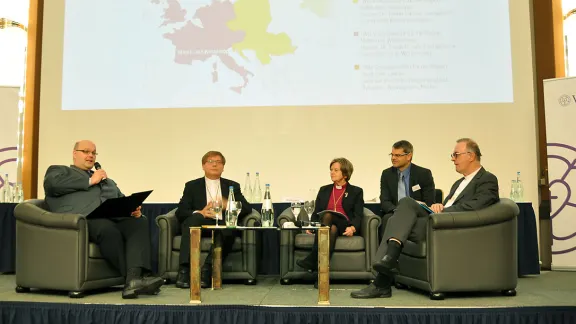
Discussing solidarity in Europe: Bishop Dr Tamás Fabiny (2nd from left), Bishop Helga Haugland Byfuglien (middle) and Bishop Dr Frank July (right). Photo: EKD/U. Hacke
Panel with European LWF vice-presidents
(LWI) – “Europe in Solidarity – Evangelical Lutheran Insights“ was the topic of a panel discussion at the General Synod of the United Evangelical Lutheran Church of Germany (VELKD), 3–5 November, in Magdeburg, Germany.
The Lutheran World Federation (LWF) Vice-Presidents for the region, Bishop Helga Haugland Byfuglien (Nordic Countries), Bishop Dr. h. c. Frank Otfried July (Central Western Europe) and Bishop Dr. Tamás Fabiny (Central Eastern Europe) offered perspectives on refugee policy, asylum and integration.
Greater need for ecumenical and interreligious cooperation
Byfuglien recalled the great challenges to solidarity “that we face in the present situation in both church and society.” The immigration from other countries had increased the need for ecumenical and interreligious cooperation and dialogue, stated the Presiding Bishop of Church of Norway.
Referring to the LWF study document The Church in the Public Space, the Byfuglien emphasized, “The public commitment of the church is part of its calling. Religious communities have a public role and responsibility.” She noted this was particularly challenging for Scandinavian churches, with their tradition of close ties to the state.
A clear witness is called for
Describing the present situation in Hungary, Fabiny, said the government’s policy on refugees and migrants was leading to growing xenophobia, and fuelling prejudice and fear.
The phenomenon is not limited to the country, said, Fabiny, bishop of the Northern Diocese of the Evangelical Lutheran Church in Hungary. He summed it up: “Europe is at a crossroads.” Fabiny praised all those people in Europe who have the courage to take a stand on opposing xenophobia: “For the Christian churches, it is about a clear witness to Christianity.”
Sharpening conscience of the political decision-makers
July, bishop of the Evangelical Lutheran Church in Württemberg, Germany, pointed to the special situation in LWF’s Central Western Europe region. The role of the Lutheran churches cannot be that of “substitute policy-making,” he said. On the contrary, they should appeal to political reason and sharpen the consciences of all decision-makers, he advised. In this context, it was encouraging to see the many connections between Lutheran churches in very different social contexts. “The inspiration can come from the message of the cross. It important to soberly perceive the realities and yet live from hope of the Kingdom of God,” July concluded. “That is what the LWF stands for.”
LWF’s European region churches have approximately 40 million members altogether. VELKD is a union of seven regional churches, representing over 9 million Lutherans in Germany.


